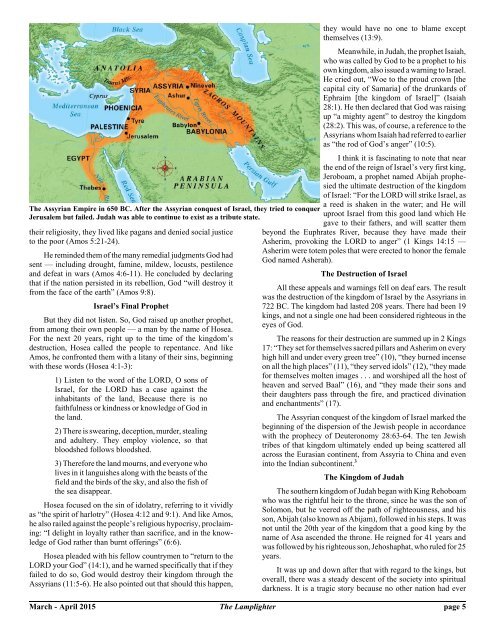Lamplighter_MarApr15_Dispersion-Jews
Lamplighter_MarApr15_Dispersion-Jews
Lamplighter_MarApr15_Dispersion-Jews
Create successful ePaper yourself
Turn your PDF publications into a flip-book with our unique Google optimized e-Paper software.
The Assyrian Empire in 650 BC. After the Assyrian conquest of Israel, they tried to conquer<br />
Jerusalem but failed. Judah was able to continue to exist as a tribute state.<br />
their religiosity, they lived like pagans and denied social justice<br />
to the poor (Amos 5:21-24).<br />
He reminded them of the many remedial judgments God had<br />
sent — including drought, famine, mildew, locusts, pestilence<br />
and defeat in wars (Amos 4:6-11). He concluded by declaring<br />
that if the nation persisted in its rebellion, God “will destroy it<br />
from the face of the earth” (Amos 9:8).<br />
Israel’s Final Prophet<br />
But they did not listen. So, God raised up another prophet,<br />
from among their own people — a man by the name of Hosea.<br />
For the next 20 years, right up to the time of the kingdom’s<br />
destruction, Hosea called the people to repentance. And like<br />
Amos, he confronted them with a litany of their sins, beginning<br />
with these words (Hosea 4:1-3):<br />
1) Listen to the word of the LORD, O sons of<br />
Israel, for the LORD has a case against the<br />
inhabitants of the land, Because there is no<br />
faithfulness or kindness or knowledge of God in<br />
the land.<br />
2) There is swearing, deception, murder, stealing<br />
and adultery. They employ violence, so that<br />
bloodshed follows bloodshed.<br />
3) Therefore the land mourns, and everyone who<br />
lives in it languishes along with the beasts of the<br />
field and the birds of the sky, and also the fish of<br />
the sea disappear.<br />
Hosea focused on the sin of idolatry, referring to it vividly<br />
as “the spirit of harlotry” (Hosea 4:12 and 9:1). And like Amos,<br />
he also railed against the people’s religious hypocrisy, proclaiming:<br />
“I delight in loyalty rather than sacrifice, and in the knowledge<br />
of God rather than burnt offerings” (6:6).<br />
Hosea pleaded with his fellow countrymen to “return to the<br />
LORD your God” (14:1), and he warned specifically that if they<br />
failed to do so, God would destroy their kingdom through the<br />
Assyrians (11:5-6). He also pointed out that should this happen,<br />
they would have no one to blame except<br />
themselves (13:9).<br />
Meanwhile, in Judah, the prophet Isaiah,<br />
who was called by God to be a prophet to his<br />
own kingdom, also issued a warning to Israel.<br />
He cried out, “Woe to the proud crown [the<br />
capital city of Samaria] of the drunkards of<br />
Ephraim [the kingdom of Israel]” (Isaiah<br />
28:1). He then declared that God was raising<br />
up “a mighty agent” to destroy the kingdom<br />
(28:2). This was, of course, a reference to the<br />
Assyrians whom Isaiah had referred to earlier<br />
as “the rod of God’s anger” (10:5).<br />
I think it is fascinating to note that near<br />
the end of the reign of Israel’s very first king,<br />
Jeroboam, a prophet named Abijah prophesied<br />
the ultimate destruction of the kingdom<br />
of Israel: “For the LORD will strike Israel, as<br />
a reed is shaken in the water; and He will<br />
uproot Israel from this good land which He<br />
gave to their fathers, and will scatter them<br />
beyond the Euphrates River, because they have made their<br />
Asherim, provoking the LORD to anger” (1 Kings 14:15 —<br />
Asherim were totem poles that were erected to honor the female<br />
God named Asherah).<br />
The Destruction of Israel<br />
All these appeals and warnings fell on deaf ears. The result<br />
was the destruction of the kingdom of Israel by the Assyrians in<br />
722 BC. The kingdom had lasted 208 years. There had been 19<br />
kings, and not a single one had been considered righteous in the<br />
eyes of God.<br />
The reasons for their destruction are summed up in 2 Kings<br />
17: “They set for themselves sacred pillars and Asherim on every<br />
high hill and under every green tree” (10), “they burned incense<br />
on all the high places” (11), “they served idols” (12), “they made<br />
for themselves molten images . . . and worshiped all the host of<br />
heaven and served Baal” (16), and “they made their sons and<br />
their daughters pass through the fire, and practiced divination<br />
and enchantments” (17).<br />
The Assyrian conquest of the kingdom of Israel marked the<br />
beginning of the dispersion of the Jewish people in accordance<br />
with the prophecy of Deuteronomy 28:63-64. The ten Jewish<br />
tribes of that kingdom ultimately ended up being scattered all<br />
across the Eurasian continent, from Assyria to China and even<br />
into the Indian subcontinent. 3<br />
The Kingdom of Judah<br />
The southern kingdom of Judah began with King Rehoboam<br />
who was the rightful heir to the throne, since he was the son of<br />
Solomon, but he veered off the path of righteousness, and his<br />
son, Abijah (also known as Abijam), followed in his steps. It was<br />
not until the 20th year of the kingdom that a good king by the<br />
name of Asa ascended the throne. He reigned for 41 years and<br />
was followed by his righteous son, Jehoshaphat, who ruled for 25<br />
years.<br />
It was up and down after that with regard to the kings, but<br />
overall, there was a steady descent of the society into spiritual<br />
darkness. It is a tragic story because no other nation had ever<br />
March - April 2015 The <strong>Lamplighter</strong> page 5


